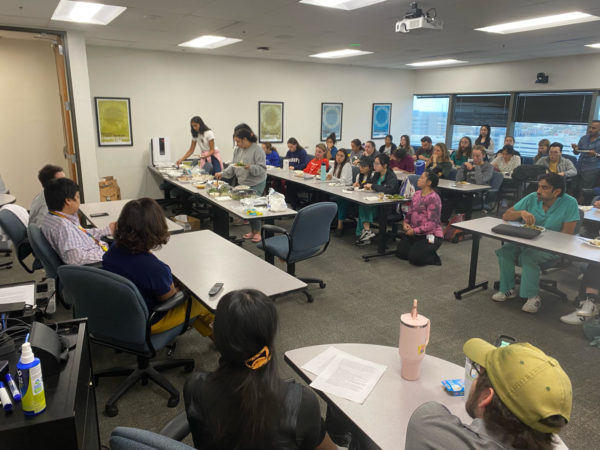
Twenty-two states have passed laws or policies restricting gender-affirming care for youth in the U.S.
As of July, Louisiana is one of them.
Passed with a U.S. Senate vote to override the veto of Governor John Bel Edwards, the “Stop Harming Our Kids Act” prohibits gender-affirming procedures for transgender minors. The law is scheduled to go into effect on Jan. 1, 2024.
After that, minors will be restricted from accessing hormone therapies, puberty blockers and gender reassignment surgeries. Physicians will be prohibited from providing such care under new civil penalties.
Supporters of the legislation argue it protects youth by delaying their ability to transition until adulthood.
Second-year medical student at the Tulane School of Medicine and president of Tulane’s American Medical Association, Sydney Kuo, said there is a disconnect between policymakers’ perception of gender-affirming care and its reality.
“Policymakers perceive transgender care as someone [who] wants to make a really rapid transition without having the confirmation of several physicians,” Kuo said. “I think that’s part of the controversy, people not understanding the process.”
Transitioning involves several physician and psychiatrist consultations before any irreversible gender-affirming procedures begin and oftentimes starts with alternative treatment before surgery is considered.
Critics of the act say it has potential to harm transgender youth, obstructing them from access to care beneficial to their mental health and self-confidence. But some families have expressed frustration with the legislation and say it stops parents from advocating for their child’s care. Opponents of the ban also say families of lower socioeconomic status will experience further barriers, as it is harder for them to travel outside of Louisiana for proper care.
Second-year medical student, Tiffany Quach, serves as vice president of the Family Medicine Interest Group at the Tulane School of Medicine. Together, she and Kuo helped arrange a physician panel to discuss the effects of the recent healthcare bans on physicians’ practice.
Dr. Myo Thwin Myint specializes in pediatrics and child and adolescent psychiatry. He said the act is actually encouraging adolescents to make decisions about their transition quicker — before the act goes into effect — when they could benefit from more discussions.
“What is happening is now setting a deadline,” Myint said. “It is actually pressuring all these adolescents who are thinking about their gender journey [and] their identity [to say] I need to start otherwise this door is closed.”
Dr. Chris Van Hise, a family physician at University Medical Center New Orleans said the act will also exacerbate strains on patient-physician interactions.
“It’s saying your doctors are not really available for you, it’s distancing them from the healthcare system,” Van Hise said. “And it’s not our doing. I think it is going to have so many further downstream effects on our care of our patients.”
According to Dr. Tina Simpson, professor and section chief of adolescent medicine at the Tulane School of Medicine, physicians must now find new ways to advocate for their patients. This may manifest itself in usage of pronouns or via patient consults, to connect them with supportive organizations or services outside of the state.
The Stop Harming Our Kids Act, part of a recent string of legislation passed concerning LGBTQ+ rights, has ramifications for all members of LGBTQ+ community.
“There’s been a lot of dehumanizing rhetoric surrounding [the LGBTQ+ community]” Van Hise said. “All your patients are people. They see that, they hear that, they internalize some of that… It has a negative effect on their health.”
On Tulane’s Uptown campus, advocacy is taking place at the community level. Petey Peterson, director of Tulane’s Office for Gender and Sexual Diversity, said the resources and privilege of being a private institution does not mean the legislation will not impact the Tulane community.
“There is a layer of protection we have [at Tulane], access to resources and expertise of people that work here,” Peterson said. “We have an obligation as an office to queer and trans students of, what does it mean to be accountable to our community?”
According to Peterson, Tulane’s LGBTQ+ community is generally aware of ongoing political events. As a staff, Tulane’s OGSD has testified in multiple hearings throughout the past two legislative sessions. Peterson said Tulane students are also highly engaged, supporting local organizations and bringing opportunities to campus.
Peterson, themself having participated in many court hearings, describes the experience as often difficult, as the ‘anti-queer and trans’ groups testify first, and do not stay to hear the LGBTQ+ community speak.
Yet, Peterson said there is strength in the queer community as they come together on Capitol Hill to support each other.
“Regardless of what laws get passed or not, [we] will still be here to take care of each other and figure out how to navigate whatever the landscape will be next year,” Peterson said. They encourage more students to get involved by connecting with the Office for Gender and Sexual Diversity.
Moving into next year, as more states restrict gender-affirming care for minors, Peterson envisions a supportive Tulane.
“Depending on what state you came from as a young queer or trans person, you’re going to have very different experiences,” Peterson said. “It’s really about us being ready at Tulane to receive those students.”
For physicians, a major component of the legislation is public education.
“Interestingly, despite all of us being imminent physicians, it seems like a lot of our classmates aren’t aware of the transgender care bans,” Kuo said. “I think that it’s really important that we discuss these issues because transgender care is important in every field.”
Quach attributes lack of awareness to students’ busy schedules.
“A lot of people want to go into the [medical] field because they want to be able to help patients and give them the best care that they deserve,” Quach said. “But I think that a lot of students may be focused on their own responsibilities. They’re not necessarily up to date on local news, but they do care.”






















Leave a Comment